December has always been the biggest month for interfaith families. But in the twenty-five years I’ve worked in the field, even in the couple when Hanukkah and Christmas overlapped, there’s never been as much coverage as this year – in mainstream sources like the New York Times, the Washington Post, the Wall Street Journal, the Chicago Tribune, the Boston Globe, the Miami Herald, the Baltimore Sun, NPR, Better Homes & Gardens, and even from England, Israel, even India.
To keep you updated, this is our longest newsletter ever. Before getting to the December holidays, there were a few other developments.
But first – please consider a charitable contribution to support the Center’s work. A generous donor has made a matching challenge grant – if you make a contribution now, it will be doubled. Find out how to donate here – or email info@cfrij.com to find out more about the match – and thank you!
Conservative Movement. Conservative Rabbi Steven Abraham argued seven years ago, and now powerfully again, that the Rabbinical Assembly should allow Conservative rabbis to officiate at weddings of interfaith couples. “When we refuse to officiate interfaith marriages, we are not protecting Judaism; we are pushing people away.” “How can we deny them our presence at this critical moment and then expect them to feel fully embraced afterward?” “Allowing rabbis to officiate at interfaith weddings does not mean abandoning our values. It means recognizing that by saying ‘yes,’ we can help these couples build meaningful Jewish lives.” “It is long past time to say ‘yes.’ Our communities, our future, and our tradition demand it.”
Exposing and Responding to Unwelcoming Attitudes. In Jeannie Sue Gersen’s important story, “Converting to Judaism in the Wake of October 7th,” she notes how unwelcoming she perceived Jewish communities to be. Gersen says the biggest barrier to conversion when she was younger was “a youthful allergy to the message that I could gain acceptance only by adopting a new identity.”

Gersen and her then husband were the subjects of a famous incident where the Orthodox day school he attended left them out of a reunion picture; about that, she says, “As a young immigrant with a fair measure of pride, I recoiled intuitively at such signals that my presence was shameful – a shanda, as Jews would say. I allowed those feelings to stymie my pursuit of what I wanted for myself, which was Judaism.”
On the other hand, the Forward’s Bintel Brief advice giver responds to a mother who wants her daughter to meet Jewish boys with this: “Implicit in your letter is a concern that your daughter isn’t dating Jewish boys and therefore isn’t on the road to marrying one. Here’s my take: … many Jews who marry non-Jews stay active in Jewish life and raise Jewish kids.”
And I appreciated this tribute to Doug Emhoff, including: “Married to a non-Jewish woman, raising his children in a blended family, he showed what may have been an otherwise hostile [Jewish] community how Jewish families in the 21st century can take on many forms.”
Unwelcoming Comments from Israel. Statements from Israel about interfaith marriage often equate it with loss of Jewish identity. That happened twice this month. “We’re watching Israel self-destruct – at the hands of its own leaders and citizens” is a very informative (and very sad) piece about divisions among Jewish Israelis. On the prospect of liberal, secular Israelis leaving the country, the author says that “The Jews would become an overwhelmingly diasporic people once more. Many will likely intermarry, and many of their descendants, perhaps, lose their Jewish identities. A century hence, the Orthodox may be left as the main expression of Judaism.” The comment about intermarriage is gratuitous, but at least it seems softened by the author saying “perhaps.”
“Judaism without God” is a curious essay by an Orthodox rabbi who wants secular Jews to be observant even without believing in God. But in a gratuitous aside, he says “an increasing number of secular Israelis have left Israel and assimilated in the diaspora. Today, secular Jews outside of Israel marry non-Jews at a rate of over 50 percent.”
Now For the December Holidays
Here are the lessons I drew from the outpouring of media coverage about the December holidays this year – each explained further below.
- The amount and tone of the coverage that was positive and accepting about interfaith families celebrating Christmas is striking.
- “Chrismukkah” for the most part is thought of as just the overlap in timing of the distinct Hanukkah and Christmas holidays – not as a mushing together of the two into something new.
- Pretty much no one is saying that interfaith families don’t transmit Jewish identity to their children if they celebrate Christmas, or that interfaith families celebrating Christmas is inconsistent with Hanukkah’s message about Jewish survival.
- Some interfaith families celebrate both holidays as cultural only, not religious. But many celebrate Christmas as cultural, but Hanukkah as religious.
- Couples’ stories show that welcoming and inclusion of interfaith families leads to Jewish engagement.
- Four beautiful essays are well worth reading.
Chrismukkah
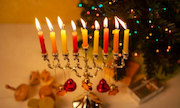 Exactly twenty years ago, in December 2004, I wrote “‘Chrismukkah’ Is a Bad Idea.” At the time, it seemed that the idea of Chrismukkah was to establish a new holiday that mushed Hanukkah and Christmas into one. That was – and is – a bad idea. It’s important to respect the integrity of the distinct traditions, not blend them into one.
Exactly twenty years ago, in December 2004, I wrote “‘Chrismukkah’ Is a Bad Idea.” At the time, it seemed that the idea of Chrismukkah was to establish a new holiday that mushed Hanukkah and Christmas into one. That was – and is – a bad idea. It’s important to respect the integrity of the distinct traditions, not blend them into one.
The general tone of most of this month’s stories recognize that the holidays are different, with any blending coming because of the unusual overlap with the first night of Hanukkah falling on Christmas day. If Chrismukkah just means celebrating two distinct holidays at around the same time – if that’s all the “blending” there is – it’s not a bad idea. (I’ve never been a fan of Chrismukkah “merch”either – this year’s favorites are reviewed in Kveller and Hey Alma – but seen in this non-blending light, it’s harmless.)
An article in Patch gives a pretty clear explanation of Chrismukkah as just the convergence in time of the two holidays. The authors of a New York Times story define Chrismukkah as celebrating both – but not mushing them together into something new (two of the interfaith families featured in the story are very mindful of instilling Jewish identity in their children). The author of the Better Homes & Garden story says the holidays are “distinctly different.”
The Boston Globe story quotes an academic who makes this point: “I think what a ‘Chrismukkah’ kind of party at best is trying to do is to recognize and validate each other, even if the claim isn’t being made that these are the same thing.” He also says that Chrismukkah “can have a little bit of an assimilationist edge to it” – but that would only be the case if the holidays were mushed together into some new holiday.
The Jewish Identity of Children of Interfaith Parents
 Twenty years ago, there was a lot of hostility toward interfaith marriage from the intellectual leadership of the Jewish community. That was the year a study purported to show that interfaith families who said they were raising their children as Jews were not transmitting Jewish identity because they were incorporating Christian holiday festivities into their lives.
Twenty years ago, there was a lot of hostility toward interfaith marriage from the intellectual leadership of the Jewish community. That was the year a study purported to show that interfaith families who said they were raising their children as Jews were not transmitting Jewish identity because they were incorporating Christian holiday festivities into their lives.
I saw that view expressed in only exactly one piece this month: Arynne Wexler in Tablet says: “And dare we convince ourselves that lighting a menorah in the same home as a Christmas tree is not a risk to preserving Jewish identity.”
Here’s what Samira Mehta said in a Chicago Tribune article about whether “a tradition like a Christmas tree cuts into a family’s faith identity”: “As one rabbi put it to me, it would be a really anemic Jewish life that was threatened by three weeks of twinkly lights.”
One of the very best essays this month addresses this issue beautifully. Rabbi Sara Mason-Barkin wrote about the biblical story of Joseph which “acknowledges the complexity of raising Jewish children in a non-Jewish world.” Jacob blesses his grandsons, Joseph’s children, who were “raised in Egypt, immersed in its culture.” We still bless our children with Jacob’s words, “May God make you like Ephraim and Menasseh,”
… embracing a legacy of being proudly Jewish and part of the world around us. We are Jewish and American, spiritual and secular, traditional and innovative. We embrace the “and” of our identities. This duality can be a source of strength.
The more Decembers I live through, the more interfaith families and conversion students I see thriving, the more confident I feel in our ability to uphold our Jewish identities while living multi-faceted lives.
Some interfaith families, of course, are raising their children in both religions, as reflected in the NPR story, a CBS news segment and an article in a Spokane secular outlet. That means the children are being raised with Jewish identity and some other identity. But many, if not most, of the interfaith families in this month’s stories say that they are raising their children “as Jewish.”
For Many Interfaith Families, Christmas Celebrations Are Cultural, Hanukkah Celebrations Are Religious
A comprehensive article in Moment takes the position that “Christmas trees, playing dreidel, setting up holiday lights, [and] eating fried foods [don’t] have much (or anything) to do with the birth of Jesus or the Jewish military victory against their ancient oppressors. If they did, … Chrismukkah wouldn’t serve the purpose it does, which is to offer a space for members of interfaith families to feel included in the joy of the holiday season. This can only happen because Chrismukkah is not inherently religious.” I may be biased, but I think that for many interfaith families, Christmas traditions do not have anything to do with the birth of Jesus, while Hanukkah traditions do have much to do with keeping the Jewish people, and Judaism as a religion, alive.
In the Washington Post, Adam Chalom and Jodi Kornfeld, who are Humanistic rabbis, suggest that we should see the December holidays as about “the human experience of the winter solstice and light”:
If we free [the December] holidays from revelation and religious rules and instead treat identity as religious heritage and culture responding to the human experience, then stories about gods and miracles can become secondary to the human experience of the winter solstice and light. Seen from this perspective, Hanukkah and Christmas have a great deal in common.
There need not be a competition between December celebrations, nor does the integrity of one holiday have to be compromised to celebrate the other. That is a false, binary choice that fosters the idea of a December dilemma. Instead, identifying with the human condition and experience, albeit from unique and different cultural traditions, brings people closer together.”
This makes good sense for many interfaith families, especially if they are raising children “both.” But many interfaith families, as reflected in many of the stories this month, are raising their children with Jewish as their religious identity, while celebrating Christmas as a cultural and not religious celebration. That doesn’t disrespect the integrity of Christmas. These families can also see the holidays as having much in common and not in conflict or a competition.
Interfaith Families Celebrating Christmas Is Not Inconsistent with the Meaning of Hanukkah
 I rarely agree with Jonathan Tobin, who in the past has been a harsh critic of interfaith marriage, So I was very pleasantly surprised that he said that the joint celebration this year is “good news for the growing number of Americans who have interfaith relationships and families where both holidays are celebrated.” He says “the blending of the two holidays in some way has become normative rather than an outlier practice. There is nothing wrong with giving gifts, and the need for interfaith families to avoid religious conflicts is obvious.” He even ends his essay with “Happy Chanukah and Merry Christmas!”
I rarely agree with Jonathan Tobin, who in the past has been a harsh critic of interfaith marriage, So I was very pleasantly surprised that he said that the joint celebration this year is “good news for the growing number of Americans who have interfaith relationships and families where both holidays are celebrated.” He says “the blending of the two holidays in some way has become normative rather than an outlier practice. There is nothing wrong with giving gifts, and the need for interfaith families to avoid religious conflicts is obvious.” He even ends his essay with “Happy Chanukah and Merry Christmas!”
I agree with Tobin that “we need to retain the holiday’s historical meaning instead of allowing it to be merged into Christmas.” I agree with his description of Hanukkah as “a festival of lights that transcends commercialism or even the acceptance of assimilation that is an inevitable part of being a small religious minority…. a holiday that emphasizes the continuance of the miracle of Jewish survival that has kept the faith of the Maccabees alive and flourishing in the Jewish homeland, as well as in America. Lighting those candles is a way for every Jew to show that the Jewish people will not die.”
In the past, Tobin might have said that interfaith families celebrating both holidays is inconsistent with Jewish survival. It’s very positive that he doesn’t say that here.
An essay in the Washington Post makes a similar point: “The lessons of Hanukkah and Oct. 8 are one and the same: The survival of Jewish identity depends on a commitment to the practices, values and traditions that make Jewish life unique.” I was concerned the author might say that interfaith marriage conflicted with that kind of commitment. I’m glad she didn’t.
Welcoming and Inclusion Matter

Several of the month’s stories note that how Jewish communities respond to interfaith families and partners from different faith backgrounds influences their engagement. “Oy to the world! Interfaith families and synagogues navigate Chrismukkah” has an unfortunate title, because the couples in the story aren’t experiencing the conflict that the title suggests, but it has some great comments from two 18Doors’ Rukin Fellows, Rabbi Jessica Lowenthal and Rabbi Alex Matthews, as well as from the USCJ’s Keren McGinity, about the importance of welcoming and inclusion.
I especially liked this quote from Rabbi Matthews: “I think what many progressive and liberal congregations have realized – and I really hope we’re trying to embrace – is that you absolutely can be an interfaith family and a Jewish family. If we want to be able to serve the Jewish community, we need to figure out how to make sure that those families are welcomed and engaged – that they feel at home in the Jewish community.” In the Miami Herald story, a practicing Catholic father of two teens raised Jewish said his attending services has been made easier by the rabbis and welcoming atmosphere at the synagogues his family has been a part of.
Positive Acceptance of Interfaith Families Celebrating Both Holidays
The amount and tone of the coverage that is positive and accepting about interfaith families celebrating Christmas is striking. JTA had a great national story by Jacob Gurvis that quoted Conservative Rabbi Nolan Lebovitz who said he urges interfaith families “to honor their family obligations surrounding Christmas – but to keep their Hanukkah observance separate.” He also quoted 18Doors’ Adam Pollack: “The way that we generally talk about the holidays with those who come to us is that this is an opportunity. That it can seem like a challenge to think about how to honor and respect multiple identities and backgrounds, but actually there’s a richness to it, and there’s no one way to do it.” (The Chicago Tribune article describes a discussion program along these lines offered by 18Doors.)
JTA also published “New children’s books for Hanukkah channel 2024’s unusual Christmas convergence” which noted that “Among the children’s books released ahead of the holidays are several that nod to the unusual calendar convergence and the increasing share of families that include both Jews and people who are not Jewish.”
The tone of the stories in local Jewish media was also positive, including Columbus, St. Louis, and Pittsburgh, where a rabbi was quoted as saying “Some people hold onto cultural connections when they marry outside their faith, and others don’t. What matters is that the holidays bring people together and foster kindness and giving, and that’s all for the good.” (A story in the secular Pittsburgh press took the same approving tone.)
Even in Israel! This headline from Ha’aretz was remarkable: “’Hanukkah Just Cannot Compete’: In Israel, Christmas Goes Mainstream” as was the sub-header: “As an ever-growing number of Jewish Israelis choose to celebrate Christmas, past objections to a Christian festivity taking center stage in a Jewish country fade into the background, and Tel Aviv shop owners are seeing their ‘biggest Christmas sales yet.’” One Israeli Jew said, about his family, “they had some questions at first…. But I think once they saw that there wasn’t a religious aspect to it, they really got it.” An academic quoted in the article said, “Of course there are many devout Christians for whom it has religious significance. But, for the most part, Christmas has become a cultural celebration, associated more with family time and gift giving than the birth of Jesus.”
Perhaps Hallmark movies are an important marker of our culture? I watched Leah’s Perfect Gift, about Leah’s first Christmas experience with her boyfriend’s straight-laced family, reviewed in the Forward and in Kveller. It’s cheese-y. But it shows the boyfriend participating in Leah’s Hanukkah observance, and the stereotypes of the Jewish family are not at all offensive (unlike those in “Nobody Wants This”). What struck me most was the positive attention to an interfaith relationship in such a mainstream cultural place. (Coincidentally, the Wall Street Journal article suggests that “Nobody Wants This” is “adding to the fused-holiday spirit this year.”)
Four Essays Worth Reading
Rabbi Adina Allen explains beautifully what it means to share in relatives’ Christmas celebrations. As a child, “Retrieving the ornaments collected over many years and several generations from their dusty attic boxes, I carefully hung each one, arranging twinkly lights until they looked just right. I relished these rituals and took them on with pride. Rather than religious acts in service of a different deity, these Christmas preparations were acts of love done in service of my family.” Later, when the holidays overlapped, she lit her menorah and recited the blessings, explaining the ritual and what it meant to her:
Being witnessed by my non-Jewish family made me feel strong and confident in my tradition, excited for a chance to share what mattered to me with those I love. I’ll never forget the image of the candles aglow on their dining room table beneath a picture of the pope, the Christmas lights twinkling in the background. While this could have been an experience of dissonance or confusion, instead it was one of clarity and connection — one that made me feel confirmed in my Judaism and grateful for the way these traditions could live side by side…. Sharing our traditions with those we love, and experiencing theirs, is a powerful way of fostering appreciation, empathy and respect and of deepening connection across difference.
Another very evocative New York Times essay addresses “The Joy of Christmas Ornaments (as a Jew).” Ronda Kaysen describes her first Christmas tree with her husband: “he pulled out a tattered cardboard box stuffed with treasures, each wrapped in newspaper or bubble wrap…. It began to dawn on me that there was a whole world inside these little details.” Over the years her family got more ornaments, including “the hand-painted chaos my children brought home from school when they were little.” This resonated with me, because one of our favorite events of the year is helping very long-term friends decorate their Christmas tree, which involves a lot of tattered boxes of wrapped ornaments, beautiful snowflakes made out of very thin balsa wood, and everyone’s favorite, a pineapple their daughter painted black as a child.
Darren Richman offers a British take on the December holidays. Written in a humorous way, Richman, who is Jewish, says he couldn’t say no to his wife’s wanting a Christmas tree after she agreed that their son could be circumcised. (Sadly, our Facebook post on this article has been inundated with comments from opponents of circumcision, which is not what Richman’s article is about.)
Behind the humor, the essay has a very serious message. Richman was worried how his grandfather would react when he told her he was dating Kate, who’s not Jewish and is now his wife. Richman writes, “If an Auschwitz survivor felt I was ‘letting the Nazis win’ then we might be in for a pretty difficult conversation. Instead, he asked me if I was happy. When I told him I was, he explained that was the only thing that mattered.” His grandfather later anointed Kate his favorite grandchild, to the chagrin of his actual grandchildren. And,
When our first son was born, he called me at the hospital and told me, between sobs, that I couldn’t imagine what it meant for a Holocaust survivor to have not just children, not just grandchildren but great-grandchildren. He didn’t sound like a man who thought his grandson had gifted the Nazis a late victory.
Rachel Hall, who works for the Reform movement, wrote a beautiful essay, “Winterfaith.” As a child, her partner had no religion, and when asked by other children what he was, he said they went camping on weekends, they were “campers.” When he and Rachel met, and she felt strongly that they would raise their children Jewish, he asked if they could be raised as “Jewish campers.”
Rachel says “winterfaith” is a more apt description for her than “interfaith” because they’re not observing two religions. She finds the December holidays challenging and admits to being scared her children won’t be proud of their Jewishness:
Right now, it doesn’t feel like the world wants proud Jews. But every day, we are proud Jewish campers… be it the food we eat, the topics we discuss, the holidays we celebrate, the Hebrew school my kids attend, the hikes we take, etc.… Being Jewish campers is about much more than feeling left out of the magic of Christmas and I am starting to have faith that my children understand that.”
Something New
I learned something new this month. In a nice piece about the holidays on a secular New Jersey site, there was this: “Jesus celebrated Hanukkah just as other Jews of his time did, according to the New Testament. The book of John mentions it: ‘At that time, the festival of the Dedication took place in Jerusalem. It was winter, and Jesus was walking in the temple, in the portico of Solomon.’ So Jesus was not only in Jerusalem during Hanukkah, but he went to the very temple where the miracle of the oil is said to have taken place about two centuries earlier.”
And a 91-year old Reform rabbi made an interesting comment to a Miami Herald reporter: “Were it not for [the Maccabees’] victory, there would have been no Christmas, because there would have been no Judaism, out of which Christianity ultimately was born, so it’s an interesting twist of history.”
Finally, if you’ve read this far, you deserve a lighter look: the Forward’s Rob Eshman offers “Celebrating Chrismukkah? There’s a food for that. That traditional Christmas dish you’re serving might just be Jewish.”
Also in the (non-December) News
- A nice profile of Deborah Reichmann, a very inclusive rabbi who serves the IFFP – Interfaith Families Project in the Washington DC area.
- A nice profile of Ari Yehuda Saks, another very inclusive rabbi, among other things co-creator of the “Interfaithing” podcast.
- A nice profile of a Druze-Jewish couple in Berkeley.
- A course from Hindu University of America on the dynamics of interfaith marriages focuses specifically on relationships between individuals from Dharmic and Abrahamic traditions.
- In the what things used to be like department: Gwyneth Paltrow’s Christian mother and Jewish father married in 1969; she says “interfaith marriage was still kind of a big deal. And so it was really hard for both of my parents’ parents that they were marrying each other. It was a bit scandalous. Nobody was happy about it. They definitely grew to accept it later in life and kind of let go of all of that.”

 We’ve expressed before the hope that “peoplehood” will be understood to include partners from different faith backgrounds, as well as their families. Our group under threat needs to be as broad as possible, with as many allies as possible.
We’ve expressed before the hope that “peoplehood” will be understood to include partners from different faith backgrounds, as well as their families. Our group under threat needs to be as broad as possible, with as many allies as possible. This article in the New York Times, “
This article in the New York Times, “ Last month we
Last month we 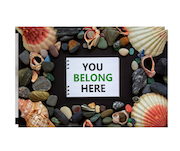 “
“ The UK Institute of Jewish Policy Research issued a new
The UK Institute of Jewish Policy Research issued a new  The Center is proud to have signed up to be a distribution
The Center is proud to have signed up to be a distribution 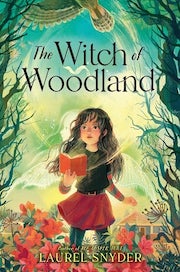 Laurel Snyder, an award-winning author of children’s books who grew up with a Jewish father and a Catholic mother, wrote a beautiful
Laurel Snyder, an award-winning author of children’s books who grew up with a Jewish father and a Catholic mother, wrote a beautiful 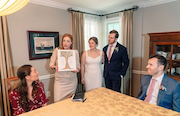 Coincidentally, JTA had an earlier interesting
Coincidentally, JTA had an earlier interesting  More stories are starting to appear about the impact on people in interfaith relationships of Israel’s war against Hamas and increasing expressions of antisemitism. In “
More stories are starting to appear about the impact on people in interfaith relationships of Israel’s war against Hamas and increasing expressions of antisemitism. In “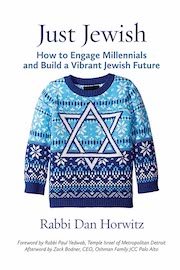 What we appreciated about the book is the matter-of-fact acknowledgment of the prevalence of interfaith relationships and seeing them as an opportunity. This starts with the Introduction: “Jewish Millennials are globally connected, have mostly non-Jewish friends, and are living in interfaith households at an incredibly high clip (whether as products of an interfaith marriage and/or in one themselves).” Or the book’s end, “For those concerned about Jewish continuity, the math argues for viewing interfaith marriages as a Jewish communal growth opportunity.”
What we appreciated about the book is the matter-of-fact acknowledgment of the prevalence of interfaith relationships and seeing them as an opportunity. This starts with the Introduction: “Jewish Millennials are globally connected, have mostly non-Jewish friends, and are living in interfaith households at an incredibly high clip (whether as products of an interfaith marriage and/or in one themselves).” Or the book’s end, “For those concerned about Jewish continuity, the math argues for viewing interfaith marriages as a Jewish communal growth opportunity.” I was very disappointed in the Kol Nidre sermon of Angela Buchdahl, senior rabbi at Central Synagogue in Manhattan, which you can listen to
I was very disappointed in the Kol Nidre sermon of Angela Buchdahl, senior rabbi at Central Synagogue in Manhattan, which you can listen to  Just before Yom Kippur, Religion News Service ran “
Just before Yom Kippur, Religion News Service ran “ “
“ Amy Beth Starr, whose husband is not Jewish, wrote very poignantly for
Amy Beth Starr, whose husband is not Jewish, wrote very poignantly for